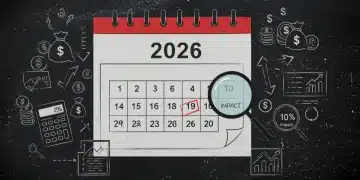Tax Strategies for High-Income Earners: Minimize 2025 Tax Liability

Tax strategies for high-income earners in 2025 require proactive planning and leveraging various deductions, credits, and investment options to minimize tax liability while aligning with financial goals and the ever-evolving tax landscape.
Navigating the complexities of the tax system can be particularly challenging for high-income earners. With careful planning and the right strategies, it’s possible to significantly reduce your tax liability in 2025. Understanding and implementing effective tax strategies for high-income earners in 2025 is crucial for preserving wealth and achieving long-term financial security.
Understanding the 2025 Tax Landscape
Before diving into specific strategies, it’s essential to understand the current tax landscape and anticipate any changes that may occur in 2025. Tax laws are subject to change, and staying informed is paramount for effective tax planning.
Potential Tax Law Changes
Keep an eye on potential changes to tax laws, such as adjustments to tax brackets, deduction limits, and credits. Legislative updates can significantly impact your tax liability.
Key Tax Provisions for High-Income Earners
Familiarize yourself with key tax provisions that specifically affect high-income earners, such as the alternative minimum tax (AMT), the net investment income tax, and limitations on certain deductions.
- Monitor legislative updates for potential tax law changes.
- Understand the impact of the Alternative Minimum Tax (AMT).
- Be aware of limitations on deductions for high-income earners.
- Plan for the Net Investment Income Tax.
Understanding these aspects ensures a foundation for implementing tax-efficient strategies tailored to the unique circumstances of high-income earners.

Maximizing Deductions and Credits
One of the primary ways to reduce your tax burden is to maximize eligible deductions and credits. There are various deductions and credits available that can significantly lower your taxable income. Identifying and utilizing these effectively is a key component of tax planning.
Itemized Deductions vs. Standard Deduction
Evaluate whether itemizing deductions is more beneficial than taking the standard deduction. Itemized deductions may include expenses such as medical expenses, state and local taxes (SALT), and charitable contributions.
Tax Credits for High-Income Individuals
Explore available tax credits, such as the child tax credit (if applicable), education credits, and energy-efficient home improvement credits. While some credits may have income limitations, others can still provide significant savings.
- Assess whether itemizing deductions is worthwhile.
- Utilize tax credits to reduce your tax liability.
- Strategically plan charitable contributions.
- Consider bunching deductions in alternate years.
Careful attention to this area can result in substantial savings by lowering your taxable income.
Strategic Investment Planning
How you invest your money can have a significant impact on your tax liability. Certain investment strategies can minimize your tax burden while aligning with your financial goals. Tax-advantaged accounts and smart asset allocation are crucial tools in this process.
Tax-Advantaged Retirement Accounts
Maximize contributions to tax-advantaged retirement accounts such as 401(k)s, IRAs, and Roth IRAs. These accounts offer either tax-deferred growth or tax-free withdrawals, depending on the type of account.
Tax-Efficient Asset Allocation
Allocate assets strategically to minimize taxes. For example, hold tax-inefficient investments, such as bonds, in tax-advantaged accounts, and hold tax-efficient investments, such as stocks, in taxable accounts.

- Maximize contributions to 401(k)s and IRAs.
- Consider Roth IRA conversions strategically.
- Implement tax-loss harvesting.
- Allocate assets in a tax-efficient manner.
Optimizing your investment strategy can help defer or eliminate taxes, allowing your wealth to grow more rapidly.
Utilizing Business and Self-Employment Strategies
If you own a business or are self-employed, there are numerous strategies available to reduce your tax liability. These strategies often involve deducting business expenses and utilizing specific retirement plans designed for self-employed individuals.
Deducting Business Expenses
Take full advantage of eligible business expense deductions, such as home office expenses, vehicle expenses, business meals, and travel expenses. Keep thorough records to substantiate these deductions.
Self-Employment Retirement Plans
Explore retirement plans designed for the self-employed, such as SEP IRAs, SIMPLE IRAs, and solo 401(k)s. These plans allow for significant contributions, providing both tax savings and retirement security.
Careful utilization of these can result in significant reduction of overall tax liabilities.
Estate and Gift Tax Planning
High-income earners should also consider estate and gift tax planning to minimize potential taxes on their estate and transfers to loved ones. These strategies involve gifting, trusts, and other tools to effectively manage wealth transfer.
Annual Gift Tax Exclusion
Utilize the annual gift tax exclusion to gift assets to family members without incurring gift tax. This strategy can gradually reduce the size of your taxable estate.
Trusts for Estate Planning
Consider establishing trusts to protect assets, minimize estate taxes, and provide for your beneficiaries. Different types of trusts can serve different purposes, so consult with an estate planning attorney to determine the best options for your situation.
Effectively planning in this area may result in greater financial security and a more seamless transition of wealth to future generations.
Staying Compliant and Seeking Professional Advice
Tax laws are complex, and it’s crucial to stay compliant with all applicable rules and regulations. Seeking professional advice from a qualified tax advisor or financial planner can provide valuable insights and help you navigate the complexities of the tax system.
Importance of Accurate Record-Keeping
Maintain accurate and organized records of all income, expenses, and deductions. This will make it easier to file your tax return and substantiate your claims in case of an audit.
Consulting with a Tax Professional
Engage with a qualified tax professional who can provide personalized advice based on your individual circumstances. A tax professional can help you identify tax-saving opportunities and ensure compliance with tax laws.
Seeking professional advice is a worthwhile investment that can pay off in the form of reduced taxes and peace of mind.
| Key Point | Brief Description |
|---|---|
| 💡 Maximize Deductions | Utilize all eligible deductions and credits to reduce taxable income. |
| 💰 Strategic Investments | Plan investments to take advantage of tax-advantaged accounts and asset allocation. |
| 💼 Business Strategies | If self-employed, leverage business expense deductions and retirement plans. |
| 🎁 Estate Planning | Plan for estate and gift taxes to reduce taxes on your estate. |
Frequently Asked Questions (FAQ)
▼
The AMT is a separate tax system that disallows certain deductions and credits, potentially increasing your tax liability. High-income earners are often subject to the AMT due to their income levels and deductions claimed.
▼
High-income earners can benefit from 401(k)s, traditional IRAs, and Roth IRAs. The best choice depends on your current and future tax situation, as well as your income eligibility for making contributions.
▼
You can deduct charitable contributions to qualified organizations if you itemize deductions. Consider donating appreciated assets to avoid capital gains taxes and claim a deduction for the fair market value.
▼
Tax-loss harvesting involves selling investments at a loss to offset capital gains. You can use up to $3,000 of excess losses to offset ordinary income. This strategy can reduce your overall tax liability.
▼
A tax professional can provide personalized advice based on your specific financial situation. They can help you identify tax-saving opportunities, ensure compliance with tax laws, and minimize your tax liability.
Conclusion
Effective tax strategies for high-income earners in 2025 require proactive planning, a thorough understanding of tax laws, and strategic utilization of deductions, credits, and investment options. By staying informed and seeking professional advice, you can minimize your tax liability and achieve your financial goals.





